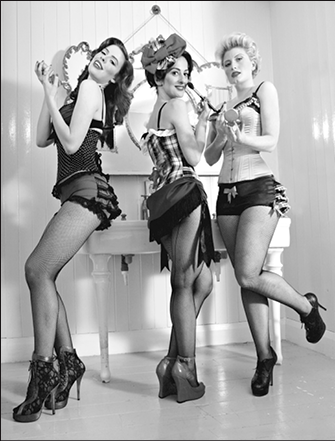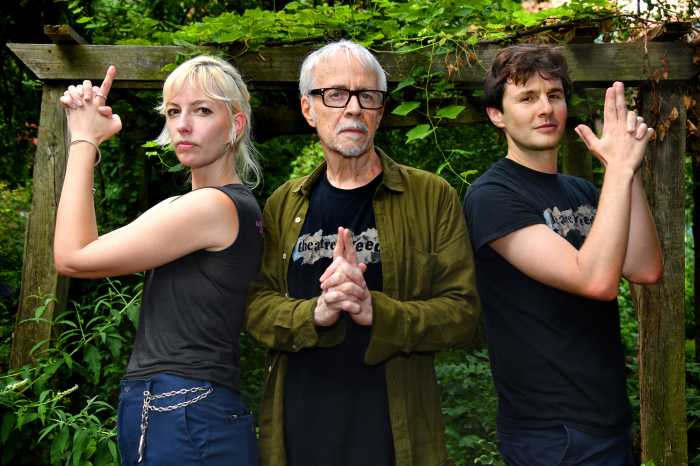BY LEE ANN WESTOVER
At Splash on West 17th Street, a recent Musical Monday hosted the fabulous mix of its vibrant gay core crowd, their straight girlfriends and European tourists. The bartenders (wearing naught but snug designer briefs) mixed their custom cocktails as the gregarious patrons sang along to “Dreamgirls” at top volume. At midnight, amidst an atmosphere charged with sex and sentimentality, the U.K.’s Puppini Sisters strode up onto the stage: Stephanie O’Brien with her violin, Kate Mullins with her melodica and Marcella Puppini with her accordion. They launched into their first tune, a swing version of Beyoncé’s “Crazy in Love.” With Vivienne Westwood cinched waists, Andrews Sisters vocal style and all the happy camp of a gaggle of drag queens, The Puppini Sisters quite literally blew the crowd away.
The next day, I had a chance to meet the women at their record label offices. In typical Puppini style, they wore coordinated outfits and dramatic red lipstick. In spite of their retro presentation, in conversation it is utterly obvious that these are modern women. Each of the three is articulate, cheeky and thoughtful. They constantly finished each other’s sentences as we discussed the artistic process and the history of this quirky outfit.
Mullins, O’Brien and Puppini began the group as a lark in 2004, viewing it as a chance to invest their vocal and instrumental chops in a style they all loved. It wasn’t long before the Puppinis were playing almost every night. “I mean, we were getting asked to play everywhere,” said Puppini with obvious pride. “In every scene as well! The gay scene, the emerging burlesque scene, the fashion scene…” Only seven months and a handful of cover tunes into the life of the band, a meeting with an A&R executive scored them a record deal with Verve. “He had been going around trying to find the new Jamie Cullum, or something like that,” Mullins recounted, “and there we were in our matching pedal pushers. We got up in front of him and we started doing our version of “Wuthering Heights” [by Kate Bush] and he just cracked up. We couldn’t tell if that was a good thing or really, really bad – but he loved it and he wanted to sign us then and there.”
Although their first album of ’80s covers and classic swing, “Betcha Bottom Dollar,” soared up jazz charts in the U.S. and Europe, the band agrees that they were still developing an identity of their own. Only a year and a half had passed since they had first sung together. Mullins said, “The first album was us still very much in our infancy, learning our craft. That has been a blessing and a curse. It opened doors because we were imitating a style that is very popular and nostalgic and people love the idea of it, but it also put us in that Andrews-Sisters-tribute-band hole.” Puppini added, “It would have been good to have had some of our own material on the first album to establish what we do.” “Our lyrics are very current,” O’Brien said, “which is one of the joys of having taken the style one step further. We now have our own modern lyrical content we are singing…we are singing about us.”
Their second CD release, “The Rise and Fall of Ruby Woo” (named after the red MAC lipstick preferred by Robert Smith) furthers the Puppini sound from a reproduction of 1940s style to something quirkier and quite original. Although the close-harmony vocal technique is still the backbone of their musical identity, this record sees them reach out from the ever-present swing tunes to beautiful, melodic pop and even a touch of disco. As always, the sound of the three voices singing just a couple of notes apart makes the women sound as if they share one otherworldly set of vocal chords. Like all the best ideas, “Ruby Woo” leaves one wondering why this hasn’t been done before.
In spite of their bona-fide stardom in the UK and their rising popularity in the US, the Puppini Sisters find that they still fight hard to be seen as skilled musicians, and not a manufactured girl group. “We’ve had people that really don’t understand the fact that we write and arrange the music ourselves,” O’Brien said. “They are used to saying to people, ‘Ok, I’ll get an arranger for your next album. I’ll get someone to write your next hit.’ And it’s like, ‘Actually, no thanks!’ We do write and arrange.” Marcella continued: “There seem to be a lot of guys who exploit emerging young talent because they don’t actually think that…it sounds really old fashioned and cliché…but I don’t think that they actually trust women to write their own songs. I mean it’s a boys’ world and they want the boys to be in charge. They want some guy to show you the way.”
Instead of becoming bogged down with frustration, it seems as if the difficulties the Puppini Sisters have endured in the recording industry have stoked a fire instead. Where others may have caved to bitterness, they seem incredibly close, and share optimistic dreams for the future. “I want us to continue doing this for awhile,” Mullins said, “and get to the point where we’re really happy creatively, because at the moment it feels like sort of an uphill struggle.” O’Brien agreed, “More people need to know about us. We have a lot we want to offer to people.” “We get such positive responses,” Mullins added, “and I don’t see how you can get people that excited and without getting even more people excited.” To judge by the crowd at Splash, they are already succeeding brilliantly.
Find out more about the group at www.thepuppinisisters.com





































